In my previous Substack I discussed the story of Brent Lee Regan. Ordinarily, I wouldn't be particularly interested in Brent's claims. However, he has been promoted across practically the entire legacy media. As a consequence, it seems, Brent was invited to speak at an international conferences on disinformation. Brent is on the up.
Brent's voice is clearly being pushed as "authentic" by the Establishment. This is because Brent's story and his opinions serve the Establishment. Whether Brent is simply a useful idiot or not is a matter for conjecture. Regardless, there are serious questions to ask about his self-declared agenda.
According to the United Nations Educational, Scientific and Cultural Organization (UNESCO):
The COVID-19 pandemic has sparked a worrying rise in disinformation and conspiracy theories. Conspiracy theories can be dangerous.
Brent wholeheartedly endorses this view.
Legislation, such as the the UK government's Online Safety Act and the European Union's Digital Services Act, in keeping with the global agenda, have been passed to stop the alleged spread of so-called online conspiracy theories. This will help governments censor whatever they deem to be disinformation. This is antithetical to all democratic ideals, but governments and intergovernmental organisations are obviously completely disinterested in alleged democracy.
There isn't any empirical evidence to back up any of the claims about "dangerous" conspiracy theories. Its just another story the Establishment tells in order to justify its oppressive censorship legislation. Tales about "conspiracy theorists" and "conspiracism" are canards. Nonetheless, when scientists examined the alleged increase in "conspiracism," they found:
[. . .] little evidence has been provided to demonstrate that beliefs in conspiracy theories have, in fact, increased over time. [. . .] In no instance do we observe systematic evidence for an increase in conspiracism.
This is not scientific evidence that the United Nations, the EU, the UK government or Brent Lee want you to appreciate. The Establishment’s real concern is rising public scepticism about the stories it relies upon to control public opinion. For the Establishment, the deceitful claim of an increasing "threat" serves their objective to impose draconian, anti-democratic legislation. For Brent Lee, this disinformation is a narrative he is evidently capitalising on.
Brent presents himself as a former conspiracist. In a 2023 interview for Bristol Cable he stated:
I'm friendly, um, former conspiracist of 15 years. Between years of 2003 and 2018 I was completely consumed by the ideology of conspiracism today I'm trying to speak out about my journey down the rabbit hole and coming out of the rabbit hole, to hopefully get people to understand conspiracism and also to hopefully bring some conspiracists out of the rabbit hole with me. [. . .] I did just completely separate myself from my real-life friends. [. . .] I just became consumed by this ideology. [. . .] This is an ideology, and it's a cult like belief system. [. . .] Throughout the pandemic I'd seen the rise of conspiracism, I'd seen people become anti-vax. [. . .] We [Brent Lee and Neil Sanders] want to make this podcast [Some Dare Call It Conspiracy] the perfect tool for deconstructing any conspiracy theory going. The actual de-radicalisation of people is just going to take time. [. . .] I always just wanted to do the right thing. I just wanted to help. And now I am.
Brent wrongly believes that "conspiracy theory" is the product of some sort of psychological malady and that holding to so-called conspiracy theories can "radicalise" a person. Hence the notion, presented in the Bristol Cable video, that Brent is a recovering conspiracist, as if it were a cognitive addiction compelling criminal behaviour. Brent is hopelessly lost, just as he was when he supposedly thought everything in the world was controlled by "secret societies."
There are some key observations to take away from Brent's statement.
— He was an alleged "conspiracicst" for fifteen years (2003 - 2018)
— He was completely consumed by what he calls the ideology of conspiracism throughout this fifteen year period.
—"Conspiracism" is, according to Brent, a "cult like belief system" that radicalises people.
— Examples of the people who have succumbed to the supposed cult mentality of "conspiracism" allegedly include people who question the safety and efficacy of the COVID-19 jabs and those who question the official accounts of 9/11 and the JFK assassination, etc.
— Brent is eager to promote his work, which he claims helps people de-radicalise themselves from the cultist belief system, because he wants to help. Brent is content that he is helping.
Therefore, there are also some key inferences to be gleaned from Brent's claims.
— Brent has a thorough understanding of conspiracy theory and, in particular, alleged "conspiracism." Brent knows what he is talking about.
— Bent has the requisite knowledge to deconstruct conspiracy theories and conspiracism and is well placed to advise people how to escape the so-called "rabbit hole."
As previously reported, Brent's first ever video on his YouTube channel was of him performing some street poetry. Brent delivered his rap at a 2010 protest against alleged underground Sharia Courts in the UK. The protest was organised by One Law for All which campaigns "against Sharia and religious arbitration in the UK, Iran and across the globe."
Brent recounts he was invited by the OLA to perform due to his involvement in another political organisation called the Anti Injustice Movement (AIM). AIM already supported the OLA so perhaps the invite was conditional.
It struck me that Brent was involved in anti-Sharia Law protests and in a wider political activist movement at the time when he claims he was "completely consumed by the ideology of conspiracism." Brent has spoken often about his alleged obsessions and how he basically became a recluse, consuming nothing but "conspiracy" media, ostracising himself from "real-life friends."
The fact that he was attending political protests, that he was a performer and was actively involved in political campaign groups, where presumably he met with like minded people he perhaps considered to be “real-life friends,” seemed to contradict his cult of conspiracism obsession story. His political activities didn't appear to have anything to do with any belief in "secret societies" ruling the world.
I wanted to know more and so I asked Brent what his obsessional conspiracism had to do with performing at street protests against Sharia courts. A full, unedited transcript of that discussion—prior to Brent abusing and blocking me—can be read here.
I acknowledged that Brent had presented evidence that supported his story that he was indeed interested in "secret societies," the Illuminati and so on. I was also aware of Brent's own definition of "conspiracism."
My contention was that Brent's personal "conspiracism" had not, in fact, impacted his life to the extent that he claimed. This suggested to me that his promoted concept of "conspiracism" was awry. That's why I wanted to understand Brent's point of view.
During the conversation Brent reiterated some of his working definitions:
A conspiracy theory is an alternative explanation of an event or subject which - without hard evidence and contrary to the "official story"- claims that it has uncovered a criminal act (a conspiracy) and the official story is a cover story for a devious plot of deception.
This is partly wrong. A "conspiracy theory" is certainly "contrary to the official story" but that doesn't mean there is no "hard evidence" to support it. Take the 9/11 "conspiracy theory" for example. Dr. Leroy Hulsey, a now-retired professor and department head of structural engineering at the University of Alaska Fairbanks, led a multi-year study in which he and his team of engineer PhDs examined the structural collapse of World Trade Centre 7 (WTC 7). The conclusions they arrived at in their peer-reviewed report brought the official 9/11 story into question. This is "hard evidence" that contradicts the "official story."
Some "official stories" could be part of a "devious plot" or they could simply be an exercise in damage limitation or possibly the product of genuine error. Only the evidence can determine the truth.
Brent then defined what he imagines conspiracism to mean:
Conspiracism is an ideology. A world view. The belief that the entire world operates through many intertwined conspiracies being planned by a network of secret societies, cults, or other allegiances. Something akin to Qanon and other "grand conspiracies" like the Illuminati/NWO, WEF Global Takeover, or Bill Gates Depop Agenda. You can not escape it because it dominates your entire world view and colours your perception of everything.
This is completely wrong. As I briefly pointed out to Brent, the scientific definition of "conspiracism" is a joke.
Brent's definition of "conspiracism" appears to partially concur with the conclusion of the experimental psychologists who authored the peer reviewed paper Dead and Alive: Beliefs in Contradictory Conspiracy Theories. This experimental psychology based paper concluded:
This finding supports our contention that the monological nature of conspiracism is driven not by conspiracy theories directly supporting one another but by the coherence of each theory with higher-order beliefs that support the idea of conspiracy in general.
These "higher-order beliefs," which Brent calls an "ideology," allegedly underpin conspiracism. Conspiracism is often referred to as "conspiratorial thinking" or "conspiracy ideation," etc. in the scientific literature. Unfortunately, experimental psychology is notoriously flakey and "Dead and Alive" was abject junk science. Now thoroughly discredited, so-called "conspiracy theory" researchers have sought other supposedly scientific definitions of "conspiracism."
The problem they have wrestled with is how to define "conspiracy theory." If you hypothesise is that a belief is irrational, you need to at least demonstrate that it is, in fact, irrational before you can even start trying to figure out why people believe allegedly irrational things.
The political scientist Joseph Uscinski is arguably the foremost scientist in the field of “conspiracy theory” research. He cited the work of philosopher Neil Levy as providing a “simple and consistent standard” by which academics could “demarcate between conspiracy theory and [real or “concrete”] conspiracy.”
Professor Levy’s “simple and consistent standard” was first outlined in his article “Radically Socialized Knowledge and Conspiracy Theories.” Levy noted that real conspiracies, such as Iran Contra, Operation Gladio, the Lavon Affair, etc. happen reasonably frequently:
Conspiracies are common features of social and political life, common enough that refusing to believe in their existence would leave us unable to understand the contours of our world.
Consequently, Levy proposed his “simple and consistent standard” to enable academics to identify the supposedly irrational claims made by people they call "conspiracy theorists." First, Levy defined what he called the "epistemic authorities":
[. . .] the distributed network of knowledge claim gatherers and testers that includes engineers and politics professors, security experts and journalists.
We might call this group of "epistemic authorities" representatives of the Establishment. Therefore, levy claimed, the conspiracy theorist could be identified because, as Brent alluded, they contradict the official story offered by the Establishment. Levy wrote:
Responsible believers ought to accept explanations offered by properly constituted epistemic authorities.
Using Levy's "standard," Uscinski concluded:
[P]roperly constituted epistemic authorities determine the existence of conspiracies. [. . .] If the proper authorities say something is a conspiracy, then it is true; if they say it is a conspiracy theory, then it is likely false.
The working scientific definition of a "conspiracy theorist" is a person who has the temerity to question the official proclamations of the Establishment and its "epistemic authorities." This is considered irrational by the Establishment. The Establishment will tell us which conspiracies are true and which aren't. Questioning the Establishment is "conspiracy theory."
Based upon this ludicrous, unhinged babble, Uscinski added:
By conspiracy belief I refer to a person’s belief in a specific conspiracy theory, for example, [the] belief that the Twin Towers fell on 9/11 due to a
carefully timed demolition. Conspiratorial thinking [conspiracism] on the other hand refers to an underlying worldview in which events and circumstances are more or less the product of conspiracy. The more a person thinks in conspiratorial terms, the more likely they will be to believe in specific conspiracy theories.
In the UK, this is often referred to as "statin' the bleedin' obvious." If you think that the official 9/11 narrative doesn't stack up then of course you are going to start wondering what other nonsense you may have been fed by state propagandists. “The Science™” relating to the farcical concept of "conspiracism" has scientifically revealed that if you think someone has lied to you there is less chance you will believe them the next time. These "scientists" are well paid for this stuff I might add.
There is no "monological nature of conspiracism." There is no unifying ideology nor any single world view commonly shared by the people labelled as conspiracy theorists, such as the tens of thousands of doctors and nurses who question the jabs. There are just people who hold a variety of opinions that question the "official story."
If Brent knew anything about the history of the term "conspiracy theorist," which apparently he doesn't, he would understand that "conspiracy theory" is nothing more than a propaganda label used by the Establishment to discredit anyone who questions power.
To be fair to Brent there are some pretty wild an wacky opinions among the wide gamut of opinions that question power. Brent obviously believed many of them himself, if his story can be believed.
Brent is deploying a composition fallacy. His argument asserts, without reason, that because some people labelled "conspiracy theorists" apparently believe the world is flat---a minuscule fringe---everyone else called a "conspiracy theorist" is prone to irrationality. Brent's proffered model of "conspiracism" is absurd tripe.
Brent evidently knows next to nothing about conspiracism and is utterly clueless about what an alleged "conspiracy theory" is. It is reasonable to conclude that Brent does not know what he is talking about and does not have the requisite knowledge to rescue anyone from any "rabbit hole," not least because the "rabbit hole" is also bunkum.
Brent has publicly stated:
After my interview with The Guardian, the editor sent a follow-up email and asked if I could give some advice on escaping the rabbit hole. [. . .] You [. . .] have to familiarise yourself with their beliefs and the information to challenge it. [. . ] Keep them close, be respectful and remind them that you value their concerns. [. . .] Just keep them close and remind them to keep an open mind. As for how to combat this on a wider scale. There are a lot of smarter people than me trying to figure that out, but if more ex-conspiracists share their experiences as openly as possible, the smart people might be able to figure it out quicker.
While we should all listen to each other and should certainly listen closely to people with specialist knowledge, that doesn't mean that we should abandon critical thinking in the process. Brent's suggested humility is wise, but we all need to be engaged in resolving social problems. Leaving it to "smart people," by which—whether he knows it or not—Brent means the "epistemic authorities," is fine if you are confident that the "smart people" aren't part of the problem.
Brent certainly did not keep me—someone he would definitely call a conspiracy theorist—close and he did not value my concerns when he blocked me. He didn’t treat me with any respect when he told me to go and fuck myself either.
I don’t really care because I’m not interested in Brent’s opinion of me. It isn’t me who professes to be concerned about what others believe. I am interested in the basis for his claims, given the way they have been used by the legacy media, because I am concerned about the political oppression of freedom of speech.
Brent claims that a crucial part of his supposed de-radicalisation strategy is to challenge the beliefs of "conspiracy theorists" with an open mind. Its seems, however, that Brent does not appreciate it when his beliefs are challenged, no matter how respectfully. Brent doesn't appear to be very open minded at all.
Brent said he was "honest" and accused me of acting dishonestly while denying me the right to reply. Personally, I thought he was rather evasive, but that's just my opinion. Again, please read the unedited transcript of our discussion and decide for yourself what you make of Brent's arguments and accusations.
His basic, suggested methodology for "deconstructing" conspiracy theories is preposterous. He suggests that people who question the JFK assassination or those who know governments regularly engage in false flag terrorism—which they can only have understood through independent research—can be convinced to forget about all the evidence they are aware of simply because Brent and his mates can supposedly demonstrate that none of this evidence exists.
This might work if the person thinks the King is a reptile but not if they think the COVID-19 jabs were rolled out without any completed clinical trials. This is why Brent's composition fallacy based ideas are so useful to the Establishment and it explains why they want all of us to believe the same drivel.
There is not a scrap of evidence that questioning power leads to radicalisation. Nor is the process of radicalisation even clearly understood. Yet Brent claims that he knows how to de-radicalise people. The legacy media reports of his misguided efforts are an attempt by journalist members of the "epistemic authorities" to convince the public that everyone who questions power is a dangerous "extremist."
Brent claims that he just wants to help people. Perhaps he does, but the evidence suggests that Brent only want's to help members of the Establishment by convincing everyone else to agree with whatever the "epistemic authorities" tell them. He is effectively part of a global propaganda narrative designed to remove everyone's right to freedom of speech and expression.
As Benjamin Franklin observed:
Without freedom of thought there can be no such thing as wisdom; and no such thing as public liberty, without freedom of speech.
We all know how dangerous unaccountable governments are. Any government that wishes to impose censorship legislation is a danger to the population it no longer serves but intends to control. Brent Lee is peddling a scientifically illiterate, epistemologically barren myth in support of undemocratic governments and their tyrannical ambitions. Yet he accuses so-called "conspiracy theorists," the very people who question power, of being dangerous.
It would be unwise to discount the possibility that Brent is a paid disinformation agent. There is evidence to at least suggest that possibility.
77th Brigade is a UK military information warfare brigade that has now been thoroughly exposed. Reportedly it was actively surveilling social media throughout the pseudopandemic.
The Daily Mail noted:
Papers show the outfits were tasked with countering 'disinformation' and 'harmful narratives... from purported experts', with civil servants and artificial intelligence deployed to 'scrape' social media for keywords such as 'ventilators' that would have been of interest. The information was then used to orchestrate Government responses to criticisms of policies such as the stay-at-home order [. . .].
Dr Ah Kahn Syed (MD PhD) and Professor Norman Fenton were among the academics that questioned the safety and efficacy of the COVID-19 Jabs. They were attacked on social media by a group allegedly linked to 77th Brigade. The group was called the Mutton Crew due to the fact that all of its members—who would swarm dissenting social media accounts and report them for spurious alleged rule infringements in an attempt to have them removed—followed the same Swaledale Mutton account run by Graham Bottley.
In nearly all instances the accounts which are responsible for mass-reporting (in order to get your account removed from twitter) have [. . .] Swaledale Mutton as a follow/follower. [. . .] It would appear that twitter helps them via their algorithm because for some reason Swaledale mutton is at the top of each of their follows lists irrespective of how long they have been following him.
Swaledale Mutton is at the top of Brent Lee’s follows list on, what is now, Elon Musk’s ‘X’ platform. In addition, Brent Lee and Neil Sanders invited Graham Bottley onto their podcast to pontificate on their bizarre theories about alleged conspiracism.
This doesn’t mean that Brent is a disinformation agent linked to the Mutton Crew and 77th Brigade but it is certainly noteworthy. Given how his narrative has been spread across the legacy media, that a man with such a small social media reach has been invited to speak at propagandist conferences and that his story clearly serves a propaganda purpose, it wouldn’t be at all surprising if he was.
I have tried to reach out to Brent in the hope of raising my concerns about his arguments and their apparent exploitation. I hoped we might reach some common ground as I don't disagree with everything he says. I wasn’t trying to save Brent, it is up to him what he chooses to believe, but using his own vernacular, and in light of his behaviour, I am starting to wonder if anyone can help Brent Lee "escape" his own, personal "rabbit hole"
****************************
Update: 21/10/2023
Suddenly—coincidentally following publication of this post—Brent has shared some alleged scientific justification for his model of conspiracism:
Not only is the paper he cites quite ridiculous, it completely contradicts Brent’s stated conspiracism model in any event. It claims that Conspiracism—called “conspiracy belief” (CB) in the paper—exist on a spectrum. One end is crazy and the other end is plausible. This is not what Brent claims. He defines CBs as:
[. . .] an ideology. A world view. The belief that the entire world operates through many intertwined conspiracies being planned by a network of secret societies, cults, or other allegiances. [. . .] You can not escape it because it dominates your entire world view and colours your perception of everything.
The paper asserts, as usual, that there is some sort of psychological flaw common to those who hold CBs but then adds that not all CBs are wrong. Obviously, if CBs (conspiracism) are sometimes accurate, it has to be more than just the inescapably flawed ideology asserted by Brent. If alleged conspiracism is also a rational, evidence based perspective this contradicts both Brent’s model and the claims of scientists that it is wholly irrational.
Again we return to the same problem that Uscinski, Levy and others still haven’t resolved. If some CBs are actually reasonable opinions how do you assign irrationality to the all of them to support your claim that every CB is the product of some sort of derangement?
The paper Brent endorses offers a truly idiotic model for assessing the veracity of alleged conspiracy theories (CTs) and the CBs supposedly underpinning them. It cannot be stressed just how ludicrous this paper is.
The psychologists Sinan Alper and Onurcan Yilmaz suggest the following approach to assessing CTs and CBs:
[. . .] we should abandon the typically unproductive pursuit of determining the truth or falsehood of a CT. Assessing the veracity of a CT requires substantial evidence, which is often time-consuming and not always feasible. However, we can evaluate the plausibility of CBs along a continuum by employing specific indicators and individually assessing the relative plausibility of each CB
That’s right! According to these “scientists” examining evidence in an attempt to establish some facts relating to an alleged conspiracy theory (CT) is a “typically unproductive pursuit.” They really can’t be bothered anyway because it is “time-consuming.”
Instead the “epistemic authorities” should apply some Micky Mouse assessment framework they’ve made up to rate the “plausibility” of the related CT. This will supposedly enable them to determine the rationality of the CB they imagine to be the underlying driver of the CT. The “framework” enables them to do this without ever examining any of the evidence at all.
You really couldn’t make this stuff up. And yet they have.





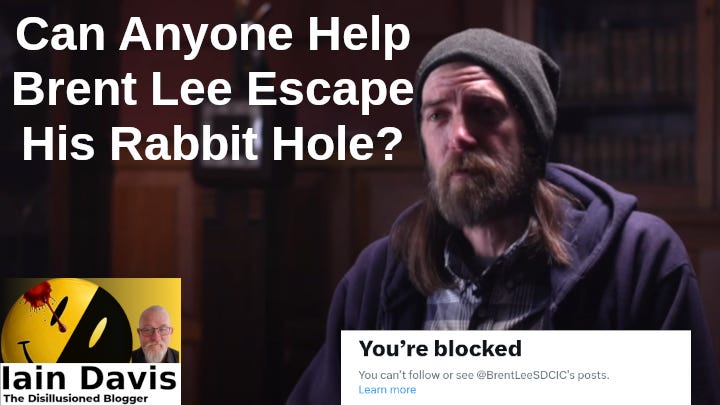
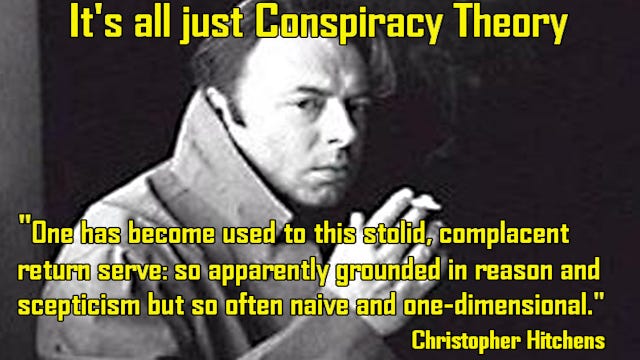
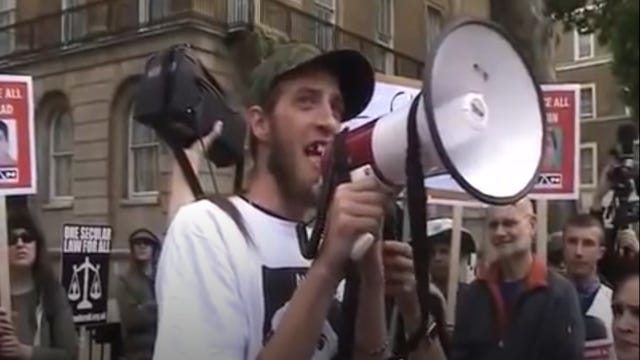
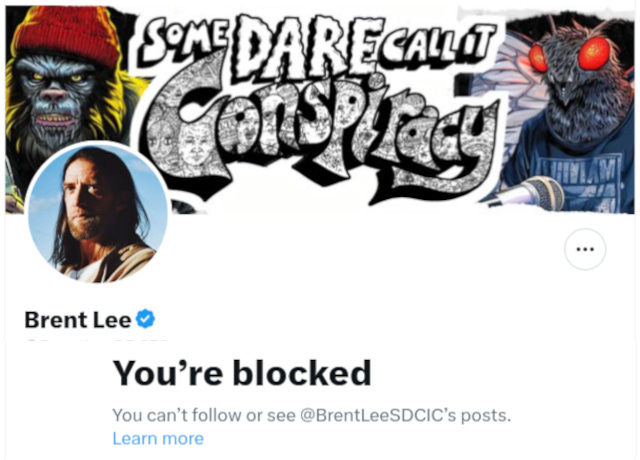
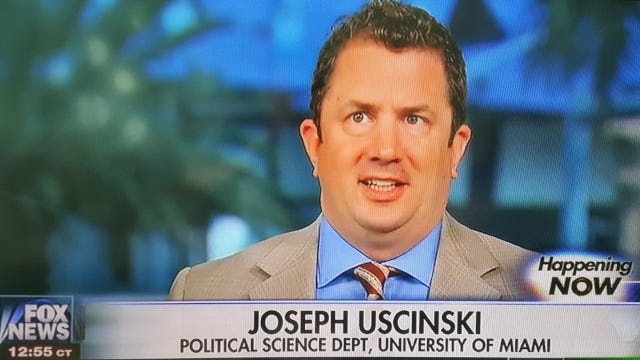
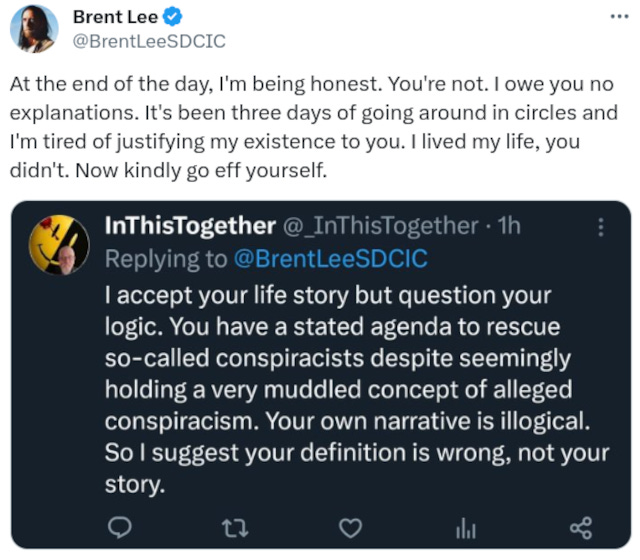

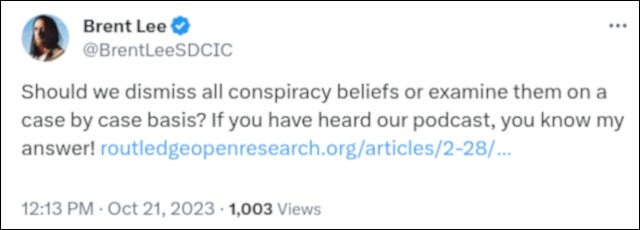
The establishment wouldn’t stand a chance without their control of the legacy media and of course their upcoming attempt at control of the internet. Many more people disbelieve the stories they’re told in the MSM than most of us think. I say this just based on chatting with colleagues etc. I believe that many people are frightened of making their skepticism public as the ‘conspiracy theorist’ label they’ll have slapped on them has become quite toxic. This is clearly intentional. However when I speak to people about my concerns about Covid/Ukraine etc many if not all, have their own doubts about the establishment narratives. I genuinely believe that we aren’t up against as many people as we might think. The likes of Spring would just like us to think so. We are all lone nutcases we are told, but she knows very well how wrong this is, otherwise why bother with us. And why unearth Regan? Most people simply don’t speak out or act on their own concerns; they accept we are lied to like it’s the standard and get on with their lives - voting for the Uniparty at the next election and expecting things to get better. Understanding the magnitude of what accepting the real truth about 9/11 would mean is simply too much for them though and they shut down. Literally I’ve seen people shut down. Like when you try and comprehend what’s outside the universe. Their minds just can’t go there. Accepting the TRUE horror of 9/11 is a rite of passage.
Sorry - I’m rambling now.
Thank you Iain. Your posts are always excellent, as well as being enlightening and entertaining. 👍🏻
The terms now used regarding this topic are infantile & repulsive to reasonable thinking.
What goes down rabbit holes? Rodents, Rabbits, Small vicious hunting dogs.
Who takes red or blue pills ? folk taking risks, who trust 'reductionist/big pharma medicine .
Who trust the Government, MSMedia, Corporations & big industrialists? Gullible lost souls, the un-informed, psychopathic gobshites.
All ''isms'' create schisms it seems- Capitalism induces moral decline, hypocrisy and a mercenary nature- lies are the dynamo, hysteria the mode, hubris & ennui the result.
No-wonder the biggest 'organs' of mercenary capitalism are busy trying to blame everyone else - even though they all transpire to have the same financiers, land-owners & family ties.